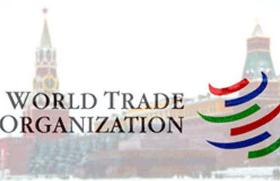Baltic States – CIS, EU – Baltic States, EU – CIS, Forum, Legislation, Markets and Companies, Russia
International Internet Magazine. Baltic States news & analytics
Sunday, 18.05.2025, 12:06
A historic moment for Russia at the EU-Russia summit: WTO membership
 Print version
Print version |
|---|
The 8th WTO Ministerial Conference, taking place from 14-17 December 2011 in Geneva, will endorse the accession of Russia on 16 December. On 16 December, the EU will sign a bilateral deal with Russia, whose accession to the WTO may become a reality in 2012.
The accession of Russia to the WTO is significant from both a multilateral and bilateral perspective. Russia is the biggest economy still outside the WTO, therefore both Russia and its trading partners will benefit from its integration into the global, rules-based system of trade relations.
Russia's accession to the WTO is especially important for the EU, Russia's biggest trading partner. This step will give a major boost to further development of our economic relationship. Russia's membership in the WTO will also prove an important stepping stone for deepening the bilateral economic integration, including through the conclusion of the ongoing negotiation on the New Agreement.
"The EU has strongly supported the accession of Russia to the WTO" said EU Trade Commissioner Karel De Gucht. "Russia’s WTO membership improves the conditions for doing business with the country and strengthens the multilateral trading system as a whole."
Reference: IP/11/1548, 15 December 2011
Advantages and figures
The Russia’s accession to the WTO is likely to take place before the end of August 2012, once Russia ratifies the negotiated results. The WTO decision to accept Russia amongst WTO Members concluded the 18-year long negotiations, the longest WTO accession process to date.
Due to WTO accession, the tariff changes alone will lead to additional EU exports to Russia worth nearly €4 billion per year. This amount does not include the import or export duties foregone. Further benefits will result from regulatory reforms and trade facilitation. Upon accession, Russia will introduce a more liberal market for service providers. Thus, benefits will be spread across key merchandise as well as services sectors as well as across the EU member states.
EU-Russia trade
Russia is the EU's third largest trading partner after the US and China with an 8,6% share of EU trade in 2010.
The EU is Russia's biggest trading partner with a 45,8% share of its overall trade in 2010. Total trade with Russia amounted to €244 billion in 2010, compared to €183 billion in 2009. Imports from Russia increased by 31,4% in 2010, and exports from the EU to Russia went up by 38,2%.
The EU is by far the most important investor in Russia. It is estimated that more than 75% of the investment stock comes from the EU.
For further information:
- On Russia's accession to WTO:
http://trade.ec.europa.eu/doclib/press/index.cfm?id=750
- On EU trade relations with Russia:
http://ec.europa.eu/trade/creating-opportunities/bilateral-relations/countries/russia/
- New website of the EU's Office at the WTO in Geneva:
http://eeas.europa.eu/delegations/wto/index_en.htm
EU-Russia summit
The 28th EU–Russia Summit is taking place in Brussels on 15 December. The EU is represented by Herman Van Rompuy, President of the European Council, and José Manuel Barroso, President of the European Commission. The delegation of Russia is led by President Dmitry Medvedev.
Discussions are expected to focus on the global economy and global governance issues, EU Russia relations, in particular Russia's WTO accession, visa and mobility issues and modernisation, including the EU-Russia Partnership for Modernisation. International issues, including developments in North Africa and the Middle East, will also be on the agenda.
Ahead of the Summit the President of the European Council Herman Van Rompuy said:
"At this summit, we will be able to harvest the results of three years constructive work. We have achieved a breakthrough on Russia’s WTO accession. At the summit, we will take concrete action for the mobility of our citizens: we will launch the first steps on the road to visa-free travel.
The EU welcomes the recent resumption of formal 5+2 talks on Transnistria, and looks forward to work with Russia to use this new momentum in enhancing the stability of our shared neighbourhood and improving the conditions for progress on other protracted conflicts. We are both committed to the Council of Europe, the OSCE and the UN framework. As part of our bilateral dialogue, the EU will recall Russia’s commitment to ensure free and fair elections and to fully respect the right of free assembly and speech."
The President of the European Commission José Manuel Barroso said:
"I look forward to a very successful Summit. Russian WTO accession is a major achievement opening new opportunities for trade and the development of bilateral relations. It should also give new momentum to the negotiations on a new and comprehensive EU-Russia Agreement. We have found solutions on Siberian overflight charges and EU airline designation in bilateral air service agreements. The Partnership for Modernisation is in full implementation, and I look forward to the new progress report from its coordinators. Russia's modernisation process should progress both on the economic and institutional fields. We are also engaged in building a real partnership between our societies. We are making very good progress on several mobility and visa issues which will bring directly visible benefits to our citizens and people-to-people contacts. I expect the Summit to approve and launch the implementation of the 'Common Steps towards visa-free travel' thus demonstrating our wish to deepen and foster our ties on all levels."
Reference: IP/11/1546, 14 December 2011








 «The Baltic Course» Is Sold and Stays in Business!
«The Baltic Course» Is Sold and Stays in Business!

